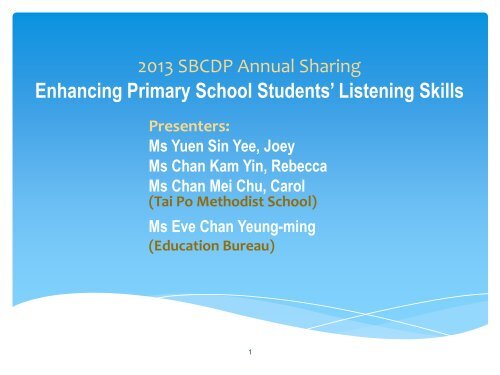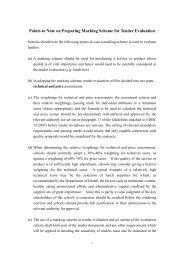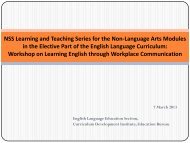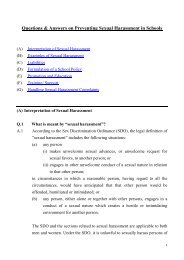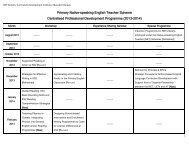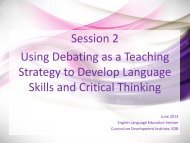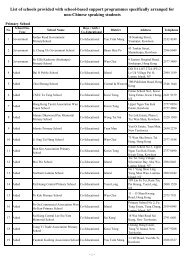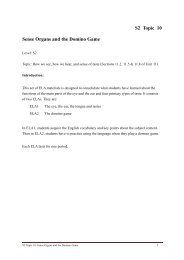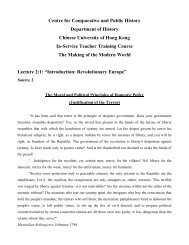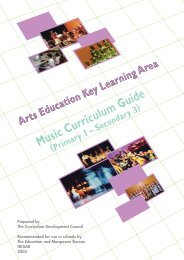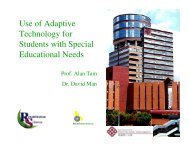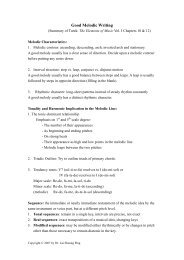Why Listening?
Why Listening?
Why Listening?
Create successful ePaper yourself
Turn your PDF publications into a flip-book with our unique Google optimized e-Paper software.
2013 SBCDP Annual Sharing<br />
Enhancing Primary School Students’ <strong>Listening</strong> Skills<br />
Presenters:<br />
Ms Yuen Sin Yee, Joey<br />
Ms Chan Kam Yin, Rebecca<br />
Ms Chan Mei Chu, Carol<br />
(Tai Po Methodist School)<br />
Ms Eve Chan Yeung-ming<br />
(Education Bureau)<br />
1
<strong>Why</strong> <strong>Listening</strong>?<br />
Second Language Learning Theories<br />
• <strong>Listening</strong> provides a more natural way to learn a language.<br />
Gary (1975)<br />
• A positive relationship between listening ability and foreign<br />
language acquisition.<br />
Practical Needs for Students’ Future<br />
• Research has demonstrated that adults spend:<br />
40-50% communication time: listening<br />
20-30% time: speaking<br />
11-16% time: reading<br />
9% time: writing<br />
Public Examination Requirements<br />
• Pre-S 1: <strong>Listening</strong> 32% ; Reading 38%; Writing 30%<br />
• TSA P3 and P6<br />
2
P.3 TSA <strong>Listening</strong> Papers Genres<br />
Genres 2009 2010 2011 2012<br />
Stories<br />
Conversation<br />
<br />
<br />
Form-filling <br />
Telephoning<br />
<br />
3
Poems<br />
P.6 TSA <strong>Listening</strong> Papers Genres<br />
<strong>Listening</strong> Genres 2009 2010 2011 2012<br />
Conversations<br />
(with teachers, classmates, family)<br />
<br />
<br />
Radio Programs<br />
<br />
Riddles<br />
<br />
Interviews (Survey)<br />
<br />
Speeches in school<br />
<br />
Weather Reports<br />
<br />
Stories<br />
<br />
News Reports<br />
<br />
Advertisements<br />
Telephone Conversations<br />
4
P.3 TSA <strong>Listening</strong> Papers Question Types<br />
Question Types 2009 2010 2011 2012<br />
Match pictures and info from tape <br />
Match feeling pictures with info from tape <br />
Relate cause and effects <br />
Minimal Pairs<br />
(Ms Wong/Tong/Hong/Kong)(Bus 15/Bus 13)<br />
(Anna’s Annie’s Anthony’s )<br />
Date (19 th May, 1998) /Year (2001/2002)/<br />
Day of the week (Monday/Tuesday/Wednesday)<br />
<br />
<br />
Time of day (7:30am, 12:30pm) <br />
Duration of Time (30/40 minutes)<br />
Telephone Numbers/money (Up to $200) <br />
Names of countries (HK, Japan, Singapore, Australia) <br />
Names of places in Hong Kong<br />
(Mong Kok/Lai Chi Kok)<br />
5
P.6 TSA <strong>Listening</strong> Papers Question Types<br />
Question Types 2009 2010 2011 2012<br />
Match pictures with info from tape <br />
Match feeling pictures with info from tape <br />
Minimal Pairs (Ms Wong/Tong/Hong/Kong) (13/30) <br />
Sequence events <br />
Relate cause and effects <br />
Predicting development of conversation<br />
e.g.(In a radio Program) ‘What will Bill say next?‘<br />
<br />
Time of day (7:30am, 12:30pm) <br />
Telephone Numbers/Temperature/Money <br />
Date (19 th May, 1998)<br />
Inferencing<br />
Rhyming pairs<br />
Metaphor/Similes eg. The elephant’s skin is like______<br />
Main idea of a poem, a riddle, radio program, advertisement <br />
Using some adjectives to describe experience<br />
e.g. tiring/boring/interesting/painful/comfortable<br />
Note-taking (Students had to fill in blanks with tel no, name of<br />
people and date)<br />
6
Purposes:<br />
1. Identify their listening<br />
problems<br />
2. Understand their attitude<br />
towards listening<br />
3. Look into their daily<br />
listening habits<br />
Respondents<br />
All P.4 students<br />
Had listening training in P.3<br />
for TSA<br />
More mature to answer<br />
questions in questionnaires<br />
Questionnaire Survey to<br />
Understand our Students<br />
7
30%<br />
25%<br />
20%<br />
15%<br />
Q1 I think listening to English is difficult.<br />
20%<br />
14%<br />
27%<br />
23%<br />
16%<br />
Strongly Agree<br />
Agree<br />
Neutral<br />
10%<br />
Disagree<br />
5%<br />
Strongly Disagree<br />
0%<br />
40%<br />
30%<br />
20%<br />
10%<br />
0%<br />
Q2 I watch English CD/DVD/TV at home. Strongly Agree<br />
12% 13%<br />
32%<br />
Agree<br />
20%<br />
23%<br />
Neutral<br />
Disagree<br />
Strongly Disagree<br />
8
Q6 There are skills I can learn to improve my listening skills<br />
50%<br />
45%<br />
40%<br />
45%<br />
Strongly Agree<br />
35%<br />
Agree<br />
30%<br />
25%<br />
24%<br />
22%<br />
Neutral<br />
20%<br />
15%<br />
Disagree<br />
10%<br />
5%<br />
6%<br />
3%<br />
Strongly Disagree<br />
0%<br />
9
School-based Curriculum Development<br />
Evidence-informed: School’s internal assessments, TSA results,<br />
questionnaire results and teachers’ observation<br />
Research-based: 2 nd language learning and listening theories<br />
1. <strong>Listening</strong> strategies training can help listening<br />
2. Different kinds of background knowledge (Content and Process) helps<br />
listening<br />
3. Awareness to the relationship between memory and listening<br />
Practical: Use of TSA materials because of copy right issues and time<br />
constraint<br />
Adopt a genre approach with emphasis on various listening strategies<br />
in interactive, meaningful and lively listening lessons<br />
10
5 <strong>Listening</strong> Genres<br />
Radio Programs P. 5<br />
Stories P.3<br />
Form-filling Situations P.3<br />
Riddles P.4<br />
Conversations P.3<br />
11
<strong>Listening</strong> to Radio Programs P.5<br />
Problems<br />
No real-life experience of<br />
listening to radio. No<br />
understanding of context of<br />
the utterance.<br />
Very limited vocabulary and<br />
grammatical structures<br />
about radio programs<br />
Don’t know the need to<br />
listen to key words<br />
TPMS <strong>Listening</strong> Lessons<br />
1. Pre-listening task of<br />
vocabulary learning<br />
2. Familiarize students with<br />
the process knowledge, one<br />
kind of background<br />
knowledge<br />
3. <strong>Listening</strong> strategy training:<br />
listening to key words<br />
12
Stages of Radio Program Interviews<br />
14
Theory Reference 1:<br />
Background knowledge and <strong>Listening</strong><br />
Content schemata<br />
Process schemata<br />
Knowledge about newscast process (Process schemata )<br />
and specific themes of the news report (Content<br />
schemata) helps comprehend news information<br />
Dunkel (1991)<br />
15
<strong>Listening</strong> to Signal Words<br />
16
<strong>Listening</strong> to Key Words<br />
17
<strong>Listening</strong> to stories P.3<br />
Problems<br />
Lacking related vocabulary<br />
Difficulties of retaining<br />
information heard to<br />
develop a holistic<br />
understanding of a story<br />
Cannot relate<br />
emotion/feelings to stress<br />
and intonation in speech<br />
TPMS <strong>Listening</strong> Lessons<br />
Peer work to discuss related<br />
vocabulary<br />
Mind-maps to help students<br />
understand the whole story<br />
Have students vocalize part<br />
of the script before the<br />
listening to let students feel<br />
the intonation differences<br />
18
19<br />
Pre-listening:<br />
Remind students<br />
some listening<br />
strategies<br />
1. Observation of<br />
picture details<br />
2. Discussion with<br />
teachers and<br />
partners to think<br />
of related words<br />
and phrases<br />
3. Ease students’<br />
nervousness<br />
4. Remind<br />
students to<br />
think of as many<br />
vocabulary as<br />
possible during<br />
this stage<br />
Yet it takes some<br />
time for<br />
students to<br />
think of the<br />
spelling of<br />
words
While <strong>Listening</strong>:<br />
Understand Development of a Story<br />
A story map<br />
summarizes details<br />
half of a story.<br />
Capture attention of<br />
less-able students<br />
Info about<br />
characters, setting<br />
and ending helps<br />
predict<br />
development of a<br />
story.<br />
20
<strong>Listening</strong> to Feelings<br />
21
Theory Reference 2:<br />
Language Learning and <strong>Listening</strong><br />
<strong>Listening</strong> ability can be improved<br />
through listening strategy training.<br />
-Prediction<br />
-Use of background knowledge<br />
-Summarizing<br />
-Vocalization: Reproduce English heard<br />
22<br />
Feyten (1991)
<strong>Listening</strong> to Form-filling<br />
Situations P.3<br />
Problems of <strong>Listening</strong> to<br />
Form-filling Situations<br />
Minimal pairs of people<br />
names, building names<br />
and numbers<br />
Telephone numbers<br />
<strong>Listening</strong> to numbers is<br />
boring<br />
23<br />
TPMS <strong>Listening</strong> Lessons<br />
More detailed teaching<br />
of minimal pairs<br />
including word initials<br />
and word endings<br />
Focus on words like<br />
double, triple, zero and<br />
oo.<br />
Introduce number games
<strong>Listening</strong> to Form-filling Situations<br />
Word Initial<br />
Minimal Pairs<br />
Word Ending<br />
Minimal Pairs<br />
25
Students’ <strong>Listening</strong> Comprehension Process:<br />
1. Match sounds with words<br />
/zi:rou/= Zero<br />
2. Interpret meaning :<br />
Zero= 0<br />
Double six= 66<br />
3. Understand sentence patterns:<br />
My number is/My mobile is/My phone number 26 is……
<strong>Listening</strong> to Telephone Numbers<br />
27
Theory Reference 3:<br />
Memory and <strong>Listening</strong><br />
Short-term memory for second language<br />
learners is often overload as they have to<br />
remember words, verb groups, simple<br />
phrases and to organize them into clauses.<br />
The capacity of short-term memory is about 7<br />
units, plus or minus 2.<br />
28
<strong>Listening</strong> to Riddles P.4<br />
Problems<br />
Students are not familiar<br />
with the genre<br />
Students need to integrate<br />
information from listening<br />
quickly<br />
Students are not skilled to<br />
pick up key words<br />
29<br />
TMPS <strong>Listening</strong> Lessons<br />
Familiarize students with<br />
the genre through games<br />
Train students to integrate<br />
information from listening<br />
input through actions and<br />
imagination<br />
Train students to pick up<br />
key words e.g. nouns,<br />
adjectives and verbs
<strong>Listening</strong> to Riddles<br />
30
From Key Words to Gestures<br />
31
<strong>Listening</strong> to Conversations<br />
Problems<br />
Too much contextual information<br />
to handle.<br />
People: Teacher and students<br />
Mother and son<br />
Theme: Open day/ Visit a friend<br />
Differences between spoken<br />
language and written language<br />
Students find it difficult to handle<br />
numbers, money, time<br />
TPMS<br />
Focused context study as prelistening<br />
tasks<br />
Lead students to see<br />
differences between spoken<br />
and written language<br />
Money, time and number<br />
games<br />
32
<strong>Listening</strong> to conversations<br />
33
Know more about the context of<br />
conversations by reading rubrics<br />
35
The hidden meaning of conversations<br />
36
Money Bingo Game<br />
37
Genre Approach<br />
Every genre has its own<br />
features. Input on vocabulary,<br />
process and context of each<br />
listening genre helps students<br />
to develop related listen skills.<br />
Students need to have<br />
repeated exposure to a same<br />
kind of genre over a period of<br />
time for better retention of<br />
knowledge.<br />
Students have very clear<br />
concept of what they are<br />
listening to.<br />
Teachers can easily plan and<br />
develop school-based<br />
listening skill curriculum<br />
Conventional Approach of Using<br />
Supplementary <strong>Listening</strong> Materials<br />
38<br />
No efforts to help students to<br />
learn the related vocabulary,<br />
process and context for each<br />
genre.<br />
Students are randomly<br />
exposed to various kinds of<br />
genres and easily forget what<br />
they have learned.<br />
Materials are test-oriented.<br />
Teachers cannot tell what<br />
skills students have mastered<br />
or identify the strengths and<br />
weaknesses of students’<br />
listening skills.
Conclusion<br />
<strong>Listening</strong> skills are as important as other language skills.<br />
Genre Approach+ <strong>Listening</strong> Skill teaching is a more systematic<br />
way to teach listening.<br />
<strong>Listening</strong> skills cannot be learned by studying a textbook.<br />
Abundant opportunities for listening outside the classroom is<br />
needed.<br />
Don’t just make students just listen. Make sure that students<br />
understand the content they are listening and the skills they<br />
are learning.<br />
HK teachers need to accumulate more pedagogical<br />
knowledge on the teaching and learning of listening.<br />
39
Local Radio Programs<br />
Crazy Chris<br />
An RTHK production. Very interesting stories<br />
about a child called Chris who lives in Hong<br />
Kong. Some stories have scripts.<br />
Sunday Smile<br />
The Sunday Smile" is an RTHK English-language radio<br />
programme for primary school students. The weekly<br />
show features competitions, music and stories.<br />
40
References<br />
Call, M. (1985). Auditory Short-Term Memory, <strong>Listening</strong> comprehension and<br />
the Input Hypothesis. TESOL Quarterly 19 (1985):765-81<br />
Dunkel, P.A. (1991). <strong>Listening</strong> in the native and second/foreign language:<br />
Toward an integration of research and practice. TESOL Quarterly 25/3: 431-57.<br />
Feyten. C. M. (1991). The power of listening ability: An overlooked dimension<br />
in language acquisition. Modern Language Journal. 75/2:173-80<br />
Gary, J.O. (1975) Delayed oral practice in initial stages of second language<br />
learning in W.C. Ritchie (ed.) Second language acquisition research: Issues<br />
and implications. New York: Academic Press.<br />
Long, D. (1989). Second language listening comprehension: A schematheoretic<br />
perspective. Modern Language Journal, 73, 32-40<br />
O’Malley, J.M. and A. U. Chamot. (1990). Learning Strategies in Second<br />
Language Acquisition. Cambridge University Press.<br />
Rubin, J. (1990). Improving Foreign Language <strong>Listening</strong> Comprehension.<br />
Georgetown University Round Table. Ed. J.E. Alatis. Washington, DC: Georgetown<br />
University Press, P.309-16<br />
41


